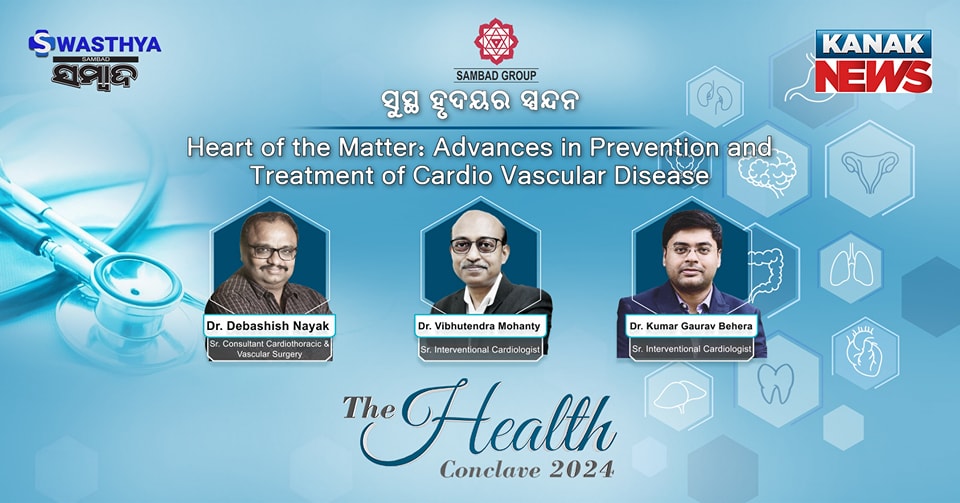Health advances in the prevention and treatment of cardiovascular disease (CVD) over recent years have been significant, thanks to breakthroughs in medical research, technology, and a deeper understanding of the biology of CVD.
In The Health Conclave 2024 4th panel discussion, Dr Debasisih Nayak, Dr Vibhutendra Mohanty and Dr Kumar Gaurav Behera discussed about medical advancements in the field of cardiology and how to prevent cardio vascular diseases.
Prevention:
a. Lifestyle Interventions
- Personalized Nutrition and Diet: Advances in genomics and biotechnology have enabled personalized dietary recommendations based on an individual’s genetic profile. For example, tailored advice on fat intake or specific nutrient needs can help manage blood pressure, cholesterol, and blood sugar levels.
- Physical Activity and Behavioral Modifications: With better data and wearable health technology (like fitness trackers and smartwatches), healthcare providers can monitor a person’s activity levels, detect early signs of CVD risk, and provide targeted interventions.
b. Risk Prediction and Screening
- Genetic Testing: Genetic screening for familial hypercholesterolemia (a condition leading to high cholesterol levels) and other genetic predispositions has become more common. Testing for mutations that influence cardiovascular risk (such as those affecting lipid metabolism) helps target preventive treatments.
- Advanced Imaging: Techniques like coronary CT angiography and MRI are improving early detection of cardiovascular problems by visualizing plaque buildup, artery narrowing, and other early signs of CVD before symptoms occur.
c. Medications for Primary Prevention
- Statins and PCSK9 Inhibitors: Statins remain a cornerstone of preventing cardiovascular disease in high-risk patients by lowering cholesterol. Newer therapies, like PCSK9 inhibitors (e.g., evolocumab and alirocumab), can significantly lower cholesterol levels and are becoming more widely used, especially for those who cannot tolerate statins.
- SGLT2 Inhibitors: Originally developed for diabetes, SGLT2 inhibitors (e.g., empagliflozin, dapagliflozin) have shown promise in preventing cardiovascular events, especially in patients with heart failure or those at high risk of cardiovascular diseases.
d. Digital Health Innovations
- Telemedicine and Remote Monitoring: The use of telemedicine for continuous monitoring of patients, particularly in managing chronic conditions like hypertension and diabetes, has expanded. Devices like home blood pressure cuffs, continuous glucose monitors, and even digital stethoscopes contribute to real-time data that can guide clinical decisions and improve prevention strategies.
2. Treatment:
a. Medications and Pharmacotherapy
- New Antithrombotic Therapies: Antiplatelet and anticoagulant drugs like direct oral anticoagulants (DOACs) are being widely used to treat conditions like atrial fibrillation and to prevent strokes. These drugs are proving to be safer and easier to manage compared to older therapies like warfarin.
- Novel Antihypertensive Drugs: Angiotensin receptor neprilysin inhibitors (ARNIs), such as sacubitril/valsartan, have emerged as effective treatments for heart failure with reduced ejection fraction (HFrEF), improving outcomes and reducing hospitalizations.
b. Interventional Cardiology
- Transcatheter Valve Replacement (TAVR): TAVR (also known as TAVI) is a minimally invasive procedure used to treat severe aortic stenosis, which was once treated only with open-heart surgery. This technique has allowed elderly or high-risk patients to avoid the risks of traditional surgery.
- Coronary Artery Bypass Grafting (CABG) and Stent Technologies: Advances in stent designs, such as drug-eluting stents, have significantly improved outcomes for patients with coronary artery disease. Additionally, new robotic-assisted CABG techniques are minimizing complications and recovery times.
c. Gene and Cell-Based Therapies
- Gene Therapy: Gene editing technologies like CRISPR are being explored to treat genetic heart diseases, such as familial hypercholesterolemia or cardiomyopathies, at the molecular level.
- Stem Cell Therapy: Stem cell treatments, such as those utilizing induced pluripotent stem cells (iPSCs), are being investigated for heart regeneration after heart attacks. These therapies aim to repair heart tissue and improve heart function after damage due to ischemia.
d. Cardiovascular Devices
- Wearable Defibrillators: Implantable cardioverter defibrillators (ICDs) have long been used to manage arrhythmias, but wearable defibrillators are now available for patients at risk of sudden cardiac arrest. These devices monitor heart rhythms and deliver shocks if necessary, preventing fatalities.
- Artificial Hearts and Ventricular Assist Devices (VADs): For patients with end-stage heart failure, mechanical circulatory support (such as left ventricular assist devices) and even total artificial hearts are providing a bridge to heart transplantation or, in some cases, a permanent solution.
e. Personalized Medicine and Biomarkers
- Biomarker-Driven Approaches: Advancements in biomarker discovery have enabled the development of precision medicine approaches. New biomarkers for myocardial injury, heart failure, and ischemic heart disease are helping clinicians more accurately diagnose, predict, and treat cardiovascular conditions.
- Pharmacogenomics: This field is helping doctors understand how genetic variations affect a patient’s response to cardiovascular drugs, enabling more personalized, effective treatments.
3. Advanced Surgical Techniques
- Robotic and Minimally Invasive Surgery: Robotic-assisted surgery is making heart surgeries like valve replacements and bypass grafts less invasive, with quicker recovery times and fewer complications.
- Endoscopic Techniques: These minimally invasive techniques are used to repair heart valves and treat other cardiovascular conditions through small incisions, reducing recovery time and hospital stays.
4. Focus on Risk Factors
- Chronic Kidney Disease (CKD): Research has revealed the strong connection between CKD and cardiovascular diseases. New treatments are being developed to manage kidney health in high-risk cardiovascular patients, helping reduce cardiovascular risks in people with both conditions.
- Diabetes Management: As diabetes is a major risk factor for cardiovascular diseases, new treatments targeting glucose control (such as GLP-1 receptor agonists like semaglutide) also offer cardiovascular benefits by reducing both blood sugar and weight.
Recent advances in cardiovascular disease prevention and treatment are transforming how healthcare providers approach CVD. From personalized prevention strategies and cutting-edge drug therapies to innovative surgical techniques and digital health tools, the future of cardiovascular care holds promise for better outcomes and quality of life for patients worldwide. Continued research in genetic medicine, advanced imaging, and smart health technologies is likely to offer even more breakthroughs in the years ahead.




